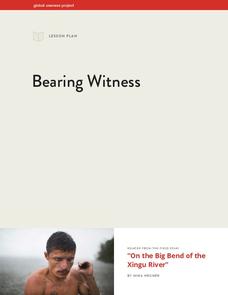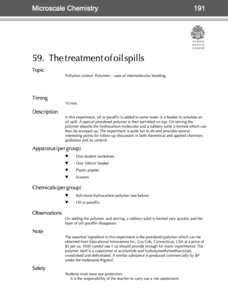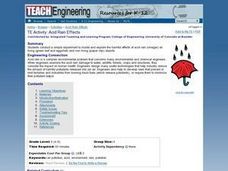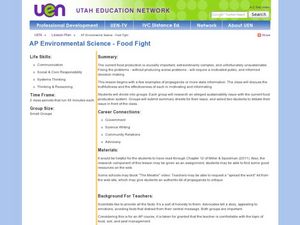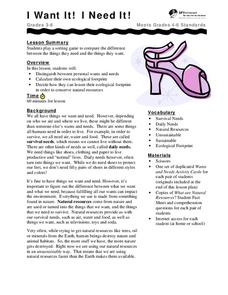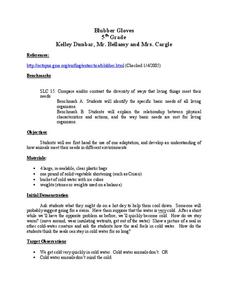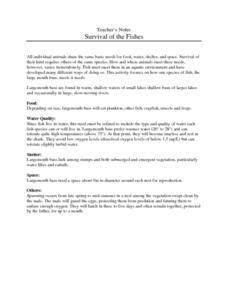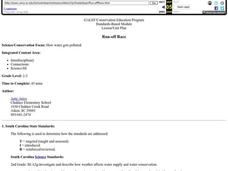Science Matters
That’s An Otter Story
Young scientists discover how sea otters' habitats have changed due to human impact. Through conversation, video observation, and story reading, scholars identify how human interactions change a specific ecosystem in both positive and...
MENSA Education & Research Foundation
Ecosystems
Explore the Earth's different ecosystems through four lessons, an assessment, and extension activities. Lessons include informative text and step-by-step instructions to apply knowledge in interactive, and thought provoking ways; such as...
NOAA
Climate Is Our Friend…Isn’t It?: Make an Extinction Polyhedron
Climate affects populations in different ways. Scholars research extinct organisms and mass extinctions in part three of the 10-installment Discover Your Changing World series. They create graphic organizers, then fill in the...
CFR Washington
Urbanization and Wildlife
Urbanization and how it affects wildlife is the focus of a presentation that uses statistics to make a case for concern and change.
NOAA
The Incredible Carbon Journey: Play the Carbon Journey Game
Class members explore the carbon cycle in the final installment of the 10-part Discover Your Changing World series. They play a simulation game where they walk through the steps carbon takes as it cycles through the different layers...
Chicago Botanic Garden
Greenhouse Gas Emissions — Natural and Human Causes
What impact do humans have on greenhouse gas emissions? What are the natural causes of these gasses? Thanks to the carbon cycle, carbon dioxide eats away at the earth's atmosphere with the intensified help of humans. Young scientists...
Global Oneness Project
Bearing Witness
A controversial construction project in South America, the Belo Monte dam, is endangering local cultures, ecosystems, and communities. High schoolers create a concept map based on an online article they read before engaging in...
Royal Society of Chemistry
The Treatment of Oil Spills—Microscale Chemistry
When oil spills happen, how is the oil cleaned up? Pupils of polymer science discover an amazing substance that turns oil into a solid during a microscale experiment. Individuals observe oil or paraffin before and after addition of the...
Curated OER
Acid Rain Effects
Get out the goggles and conduct a simple experiment to model and explore the harmful effects of acid rain (vinegar) on living (green leaf and eggshell) and non-living (paper clip) objects. Young chemists observe and describe the harmful...
Curated OER
Fueling Extreme Weather
First graders identify the different stages in the hydrologic cycle. To study earth science, they investigate how sunlight affects the earth's temperature. They also discuss how the sun's energy is transformed.
Curated OER
AP Environmental Science-Food Fight
The content in this lesson is of a controversial nature. Please review to make sure it is suitable for your class. A video, The Meatrix is shown to the class, and then they discuss the emotionally-charged language that it uses. They are...
NOAA
I Didn’t Do It…Did I?: Make Your Own Greenhouse Effect
How do greenhouse gases affect the climate on Earth? Pupils explore the concept by first building their own apparatuses to model the greenhouse effect. Then, they record data to measure temperature change and determine...
Science 4 Inquiry
The Ups and Downs of Populations
Life has its ups and downs ... especially if you're an animal! Biology scholars engage in a population study through an inquiry-based lesson. Pupils work together to explore the factors that affect deer populations, then examine the...
BioEd Online
Gravity and Buoyancy
Would a baggie filled with water have the same shape sitting on a table as it would in a bucket of water? Why not? Allow learners to find out first-hand the effects of gravity acting alone on the baggie, as well as when gravity is...
Curated OER
Rainbow Trout
Learners investigate the many varieties of both tropical and freshwater fish, and find out about the anatomy of these creatures. They explore biodiversity in bodies of water, including information about coral reefs, and study the effects...
Curated OER
Which Animal Lives Where?
Use this lesson plan in your classroom for a quick and easy way to review animal habitats. Young children use magazine clippings, pictures provided, or other resources to create a collage depicting an animal habitat. This is a great way...
City and County of San Francisco
I Want It! I Need It!
Discuss wants and needs with your elementary ecologists and get them to consider what would happen to our natural resources if we all got everything that we want. Learners play a card sorting game and take an ecological footprint quiz on...
Core Knowledge Foundation
Taking Care of the Earth Tell It Again!™ Read-Aloud Anthology
A read-aloud anthology closely examines human impact on the Earth while boosting reading comprehension skills. Through stories, scholars examine the concepts of natural resources, pollution, garbage, and recycling and brainstorm...
NOAA
Stressed Out!
Are our oceans really suffering due to the choices humans make? The sixth and final installment in the volume of activities challenges research groups to tackle one of six major topics that impact ocean health. After getting to the...
Curated OER
Pond 1: Pond Life
Learners work together to investigate familiar and unfamiliar ecosystems. Using the internet, they discover how different organisms use their environment to satisfy their needs. They also examine the relationshiops between organisms...
Curated OER
Blubber Gloves
Fifth graders examine animal adaptations and how they meet their needs in a variety of environments. They discuss how they might adapt to their own environment before discussing how an animal could adapt. Next, they complete an...
Curated OER
Survival of the Fishes
Young scholars study the aquatic environment in which largemouth bass are able to survive. They participate in a mystery animal activity based on their own basic needs to determine the identity of the largemouth bass.
Curated OER
Run-off Race
Students create wetland models in pans and use them to experiment to see how plants help slow the flow of runoff water and keep our waterways clean.
Curated OER
Glaciers and Ice Wedging
Fourth graders observe buckling sidewalks and potholes before attempting to determine how these things are caused. They freeze water filled plastic cups that have been covered. As the water freezes, the students observe what happens to...
Other popular searches
- Water and Our Environment
- Water Environment
- Conserving Water Environment
- Clean Water Environment
- Water and Environment
- Environment Water Use
- Environment Water Cycle






